by Naomi L. | November 8, 2017 | Blog, Creative Writing |
So you’ve made it through the first week of NaNoWriMo! How’s that novel coming along? Whether you’re a veteran or this is your first NaNoWriMo ever, chances are you’re already starting to feel a little doubt creeping in. Maybe you’ve fallen behind on your goal, or maybe you’re beginning to feel the burnout from all that writing. But the moment your energy falters is when you expose yourself to the poisonous idea that maybe you’re not a real writer after all. Don’t give in to that thought!
So to keep you motivated through at least the next week of NaNoWriMo, here are ten signs that you are a real writer. Remind yourself of some (or all) of these truths every day and know that you can do this! Good luck!
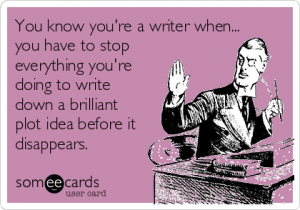 1) Telling stories is one of your best and favorite skills. – Nothing says “I’m a writer” like the gift of telling stories. If your friends and family often read your work and ask you to tell them a tale every time you hang out, you know you’re on the right track!
1) Telling stories is one of your best and favorite skills. – Nothing says “I’m a writer” like the gift of telling stories. If your friends and family often read your work and ask you to tell them a tale every time you hang out, you know you’re on the right track!
2) You’d rather spend time in your fictional worlds than your real one. – Where would you rather celebrate the holidays: the office Christmas party or the Yule Ball at Hogwarts? That’s what I thought.
3) The conversations you have with the voices in your head are way more interesting than the ones you have with real people. – Who wants to waste time on small talk when you could be discussing dragons or planning how to stop that alien invasion? The characters in your head will always have something more interesting to contribute to the conversation!
4) You carry a notebook with you everywhere you go. – Inspiration strikes when you least expect it. You gotta be ready to capture those ideas when they come to you!
5) You can find the tiniest flaws in your favorite novels. – Thinking like a writer means reading like a writer. Because you understand the craft, you can read any book and spot the smallest errors from continuity to misused words that most readers can’t. It’s kind of like having a superpower, isn’t it?
6) You never stop brainstorming story ideas. Ever. – You could be in the middle of an important business meeting, out to lunch with friends, or spending the holiday with family, but your creative mind will never shut off completely. Story ideas are everywhere! How could you possibly stop thinking about them?
7) You’re pretty sure your blood is 90% coffee. – How else are you supposed to power through those late-night writing sessions?
8) You’re a master of procrastination. – Sure, everyone procrastinates, but nobody can perfect the art quite like writers can. Writing is hard, ok? Sometimes we need a break to read or snack or play video games. Just five more minutes, I swear!
9) But once you get into that writing groove, you couldn’t stop if a meteor hit you! – Writing time is sacred. You know you’re a writer when even your family and/or significant other know not to disturb you when you’re in the zone. Bonus points if it’s because they know they’ll be punished if they do!
10) Writing is your life! – You love to write! You’ve already committed to writing a novel, haven’t you? What other proof do you need that you’re a real writer?
Have you ever doubted yourself or your writing skills? How do you handle those slips in self-confidence?
by Naomi L. | November 6, 2017 | Blog, Word of the Week |
Word: epistemic
Pronunciation: e-pə-STE-mik / e-pə-STEE-mik
Part of Speech: adjective
Definition: relating to knowledge or to the degree of its validation
Source: Oxford Dictionaries
So funny story: I originally had a different Word of the Week planned for today, but when I looked it up on Merriam-Webster for research, I noticed today’s vocabulary word ranked first among the trending words at the top of the page and knew I had to jump on it. According to the dictionary’s website, searches for this word rose over 16,000% following the publication of a Vox article that used it in its headline. After reading the article, I can see why this word would suddenly become so relevant today: America does in fact seem to be suffering an “epistemic” crisis!
Something described as “epistemic” is related to knowledge or to the degree of validation of that knowledge. The word arose in the 1920s and comes from the Greek noun epistēmē, meaning “science” or “knowledge”. This noun in turn derives from the verb epístamai, which means “to know”.
The word “epistemic” may sound familiar to those who know about “epistemology“, the branch of philosophy that studies the theory of knowledge and how it relates to concepts like truth, justification, and belief. Note that there’s a difference between “epistemic” and “epistemological”: the former refers specifically to knowledge itself while the latter refers to the study of knowledge. If your stories deal with themes of knowledge and the difference between truth and opinion, “epistemic” is a great word to add to your vocabulary!
What are your thoughts on this word? Any suggestions for future “Word of the Week” featured words?
by Naomi L. | November 1, 2017 | Blog, Creative Writing |
Welcome to November, otherwise known to writers as National Novel Writing Month! It’s time once again to shift your writing into high gear by writing a 50,000-word novel in 30 days! Of course, it’s not so easy to take on this challenge without a fair amount of motivation to get you going, and one of my favorite sources of writing inspiration is collections of quotes by well-established writers. Over the past two years, I’ve started November by sharing NaNoWriMo motivation in the form of ten writing quotes from famous authors. Now let’s dive into another set of quotes for inspiration!
So to get you motivated for NaNoWriMo 2017, here are another ten inspirational quotes about writing from famous storytellers. Enjoy, and good luck in this year’s NaNoWriMo!

1) If you want to be a writer, you must do two things above all others: read a lot and write a lot. – Stephen King
2) Stories may well be lies, but they are good lies that say true things, and which can sometimes pay the rent. – Neil Gaiman
3) After nourishment, shelter and companionship, stories are the thing we need most in the world. – Philip Pullman
4) All you have to do is write one true sentence. Write the truest sentence that you know. – Ernest Hemingway
5) A word after a word after a word is power. – Margaret Atwood
6) There is something delicious about writing the first words of a story. You never quite know where they’ll take you. – Beatrix Potter
7) A writer is someone for whom writing is more difficult than it is for other people. ― Thomas Mann, Essays of Three Decades
8) I write to give myself strength. I write to be the characters that I am not. I write to explore all the things I’m afraid of. – Joss Whedon
9) You can make anything by writing. – C.S. Lewis
10) Write the kind of story you would like to read. People will give you all sorts of advice about writing, but if you are not writing something you like, no one else will like it either. – Meg Cabot
What are your thoughts on these writing quotes? Any others you’d add to the list for NaNoWriMo?
by Naomi L. | October 30, 2017 | Blog, Word of the Week |
Word: minatory
Pronunciation: MI-nə-toh-ree / MY-nə-toh-ree
Part of Speech: adjective
Definition: expressing or conveying a threat
Source: Oxford Dictionaries
It’s Halloween tomorrow, so why not have some fun learning a new vocabulary word for the occasion? I came across this one after researching synonyms for “sinister” this week, and while I do think last year’s word was more fitting for Halloween, this year’s word is considerably more versatile in fiction. “Macabre” may be an excellent word for horror and Halloween-themed stories, but “minatory” can describe the threatening actions in all types of plots!
“Minatory” describes an action that conveys or expresses a threat. The word arose in the mid 16th century and comes from the Latin adjective minatorius, meaning “threatening”. This adjective derives from the verb minari, which means “to threaten”.
While “minatory” can describe any threatening action, note that Oxford Dictionaries labels it as a formal word, so you may want to limit its use to more proper contexts. Also notable is this word’s relation to the adjective “minacious“, which shares its Latin root and means “menacing” or “threatening”. If your characters tend to threaten each other, you may have fun writing about their “minatory” actions!
What are your thoughts on this word? Any suggestions for future “Word of the Week” featured words?
by Naomi L. | October 25, 2017 | Blog, Creative Writing |
With Halloween just around the corner, it’s a great time to binge watch scary movies and practice writing horror stories. And the scariest part of a horror story—as well as one of the scariest parts of most stories in general—is usually the antagonist, the villain who embodies the evil of the plot and serves as the main barrier between the hero and victory.
But antagonists can also be the most challenging characters to write. Not only do you need to make them just as interesting as your protagonists in order to carry the story, but you often have to do it in fewer words, as villains usually get less focus and have limited room for character development. Not every writer can pull this off well, but fortunately, there are a few writing tips you can use to turn your villains from flat and boring to fascinating and terrifying.
So in the spirit of Halloween and scary characters, here are three writing tips to help you create villains who are just as interesting as your heroes. Enjoy!
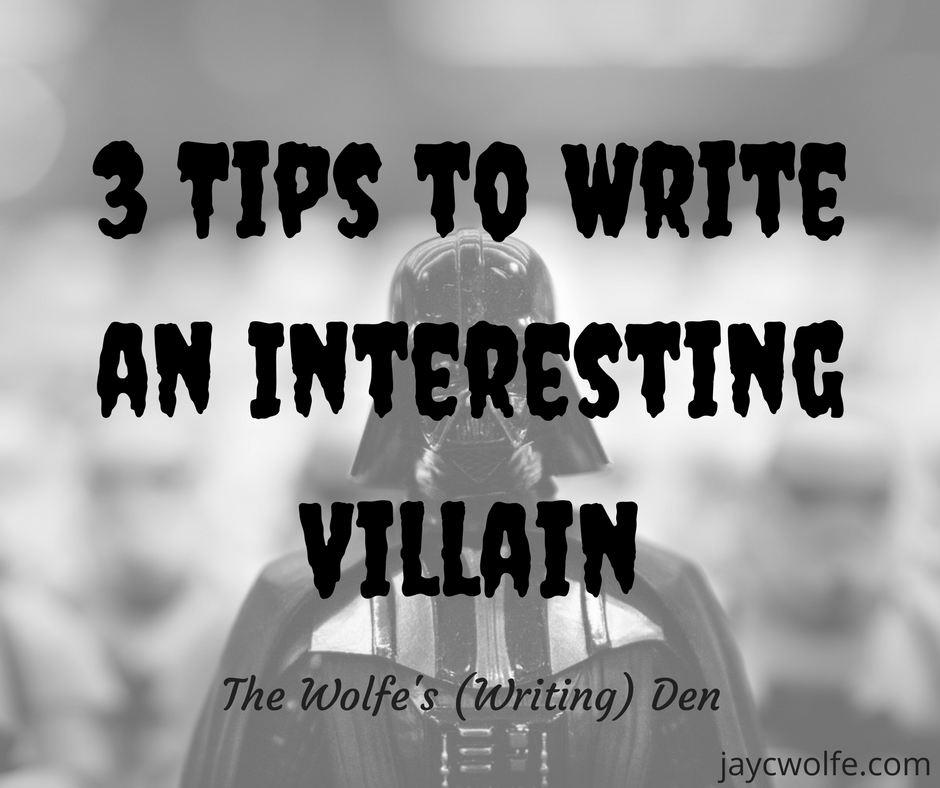
1) Villains should be just as three-dimensional as their heroic counterparts.
I’m bad, and that’s good. I will never be good and that’s not bad. There’s no one I’d rather be than me. – Bad-Anon closing affirmation, Wreck-It Ralph (2012)
Have you ever read a book or watched a movie that starred a kickass hero, but for some reason they never seemed to reach the peak of their awesomeness? Chances are what could have been a great story arc fell flat because of a terribly written villain.
We know that part of telling a good story is creating good characters, but many writers tend to focus all that character-building attention on their protagonists and not enough on their antagonists. (Don’t feel bad if you can relate; I’ve definitely been guilty of this myself.) I’m sure at some point, we’ve all fallen into the trap of making an antagonist “just a bad guy”, but it’s important to remember that villains are people too—well, in the broader sense of “sentient beings”—and much like real people, all characters should be three-dimensional. No exceptions.
Personally, I hate it when a villain has literally zero depth. It may seem like a good idea on the surface to make a bad guy as bad as possible, but no one is purely evil for the sake of being evil, any more than a hero is good just because the story calls for it. If we take exceptional care to give our protagonists clear dreams, goals, strengths, and weaknesses, we should do the same for our antagonists. A hero is only as good as their villain, right?
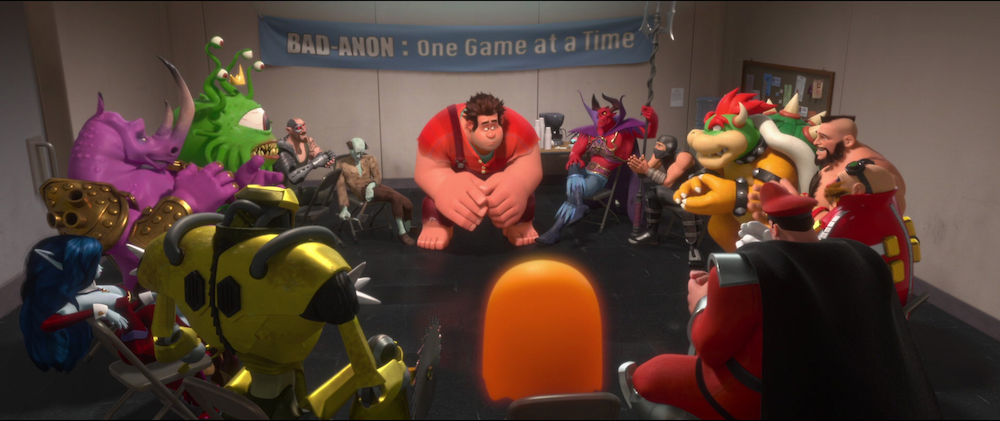
The Bad-Anon support group for video game villains (Wreck-It Ralph, 2012)
One of my favorite modern examples of how much depth a villain can have is the 2012 Disney movie Wreck-It Ralph. Given how everyone treats him like a monster and almost no one respects him, Ralph is a good example of a character who was forced into the role of a villain despite not actually deserving it. Of course, after leaving his game and setting out on his own adventure, he does prove to everyone that he’s much more than a “bad guy” in the end. While the movie isn’t about a “villain” per se, Wreck-It Ralph does teach two important lessons about antagonists:
- Villains and conflict are indispensable to storytelling (and therefore must be respected) – Fix-It Felix Jr. is no longer playable without “the bad guy who wrecks the building”
- No one is the villain of their own story – despite being the bad guy of Fix-It Felix Jr., Ralph is clearly the hero of his own adventure
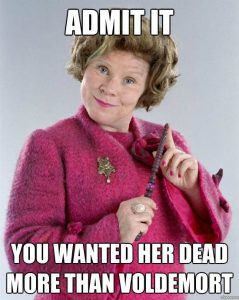 In contrast, my least favorite antagonists are usually the ones whose only defining characteristic is “being evil”. You know who I’m talking about: those one-dimensional a-holes with zero redeeming qualities who can make you fume or gag every time they appear on page or screen, like:
In contrast, my least favorite antagonists are usually the ones whose only defining characteristic is “being evil”. You know who I’m talking about: those one-dimensional a-holes with zero redeeming qualities who can make you fume or gag every time they appear on page or screen, like:
It’s one thing to give your character less-than-noble motives; it’s another to go out of your way to make the audience hate them. But then again, even “pure evil” can be interesting when written well (case in point: the villains listed above are all bad people, but not necessarily bad characters). It all comes down to a delicate balance between characterization and storytelling.
So when writing your antagonist, always make sure you give them as much background and attention to detail as you give your heroes. Remember that a good villain has depth and personality, not just “evil plans”. Bonus points if you can make your audience sympathize with the bad guy. After all, hero or villain, we’re all still people. Which brings me to the next point…
2) Nobody starts out as a bad guy, not even villains.
You either die a hero, or you live long enough to see yourself become the villain. – Harvey Dent/Two-Face, The Dark Knight (2008)
Although it’s easy to think of the world in terms of good and evil, the fact is that all people start out as blank slates. Every individual has a story to tell, a history behind the person they become. It’s the circumstances of one’s story—and the choices they make in response to those circumstances—that determine if they become a hero or a villain (or neither). In a nutshell, bad guys aren’t born, but made.
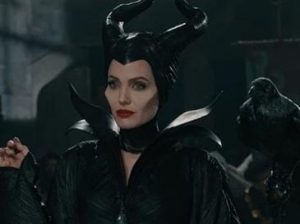
Maleficent crashes Princess Aurora’s christening (Maleficent, 2014)
A well-known modern example of the making of a villain is Disney’s 2014 Sleeping Beauty retelling, Maleficent. While the 1959 animated movie portrayed this character as little more than a vindictive witch (who seriously could not let go of a grudge), this version of the story digs a little deeper into how the fairy Maleficent became malicious enough to curse an innocent child. Between the beginning of the film and Aurora’s christening, we learn that Maleficent started out kind and idealistic, but her relationship with Stefan turned her bitter and vindictive against humankind. Say what you will about the film’s execution, but at least it establishes a clear backstory and motive for a character who would otherwise be just another run-of-the-mill fairytale villain.
If you feel your antagonist is missing clear motivation for their actions, try giving them a backstory that explains how they became evil. You don’t have to expose their entire life story to the audience, but at least convince us of their reasons for opposing the heroes. Show us what broke them so badly that it turned them to the dark side. Remember, the only people who start out as bad guys are cartoon villains; everyone else has a story.
3) An interesting villain is just as strong, smart, and capable as the hero (if not more).
A census taker once tried to test me. I ate his liver with some fava beans and a nice Chianti. – Hannibal Lecter, The Silence of the Lambs (1991)
Take a second to think about your favorite villains in any books, movies, or TV shows. What do they all have in common (aside from the fact that they’re doing bad things to good people)? Why do you find them so fascinating? Because they’re good at what they do!
The most interesting and popular villains are usually those who challenge the heroes, and it’s obviously not by being total pushovers. Darth Vader mercilessly kills any subordinate who disappoints him and pushes Luke Skywalker to his limit in their first lightsaber duel. Before his downfall, Voldemort was so terrifying that witches and wizards everywhere were afraid to say his name. A large part of what makes Hannibal Lecter so fascinating and frightening is how mysterious and complex he is. Basically, if an antagonist can draw your full attention and steal every scene they’re in, you know they can give the heroes a run for their money!

The Joker being interrogated by Batman (The Dark Knight, 2008)
One of the most popular examples of a brilliant and highly capable villain is the Joker from The Dark Knight. Aside from his unpredictability, a major reason the Joker is so interesting is that he’s one of the few villains who actually challenges Batman. Like the embodiment of chaos itself, he keeps the hero and the entire police force of Gotham guessing and thwarts them so many times that we as the audience can’t help but wonder what he’s going to do next at every turn. Now that’s a well-written villain!
So keep in mind, if you find your heroes aren’t reaching their full potential, the problem might be with your villains. Superpowers and high intelligence aren’t enough to make a great hero; you have to give them someone or something to use those abilities against. Make your antagonists just as strong and smart as the protagonists, then have them push each other to their limits. Only by overcoming a nearly insurmountable obstacle will your hero’s story arc be as satisfying and captivating as it deserves. In more ways than one, an antagonist can make or break your story!
Do you struggle with writing antagonists? What are your thoughts on these tips for writing an interesting villain? What other tips would you add to this list?
by Naomi L. | October 23, 2017 | Blog, Word of the Week |
Word: mercurial
Pronunciation: mər-KYOO-ree-əl
Part of Speech: adjective
Definition: subject to sudden or unpredictable changes of mood or mind
Source: Oxford Dictionaries
Here’s another word I learned from the Elevate – Brain Training app. Like other words featured in past Word of the Week entries, I picked this one up from the Pronunciation game, though I found it so interesting after reading it that I knew I had to look it up. Interestingly, I realized I had just learned a new word that I could use to describe myself; I’ve gone through so many changes of mind and mood in my life that I could easily be considered “mercurial”!
A “mercurial” person is someone who’s prone to unpredictable or sudden changes of mind or mood. The word arose in late Middle English in the sense “of the planet Mercury” and comes from the Latin adjective mercurialis, meaning “relating to the god Mercury”. This adjective stems from the proper noun Mercurius, the Latin name of the Roman god Mercury. The current definition dates from the mid 17th century.
As its Latin root suggests, aside from its main definition, the word “mercurial” also relates to Mercury, both in the sense “of or containing the element mercury” and the sense “of the planet Mercury” (this latter case should be capitalized because it refers to a proper noun). The word can also function as a noun to mean “a drug or other compound containing mercury”. Note that as a synonym for “volatile” and “temperamental”, “mercurial” should be used in a negative sense. If your characters are constantly changing their minds (or if you write about any of the different “Mercuries”), “mercurial” could be a great word to include in your stories!
What are your thoughts on this word? Any suggestions for future “Word of the Week” featured words?
 1) Telling stories is one of your best and favorite skills. – Nothing says “I’m a writer” like the gift of telling stories. If your friends and family often read your work and ask you to tell them a tale every time you hang out, you know you’re on the right track!
1) Telling stories is one of your best and favorite skills. – Nothing says “I’m a writer” like the gift of telling stories. If your friends and family often read your work and ask you to tell them a tale every time you hang out, you know you’re on the right track!



 In contrast, my least favorite antagonists are usually the ones whose only defining characteristic is “being evil”. You know who I’m talking about: those one-dimensional a-holes with zero redeeming qualities who can make you fume or gag every time they appear on page or screen, like:
In contrast, my least favorite antagonists are usually the ones whose only defining characteristic is “being evil”. You know who I’m talking about: those one-dimensional a-holes with zero redeeming qualities who can make you fume or gag every time they appear on page or screen, like:


Recent Comments